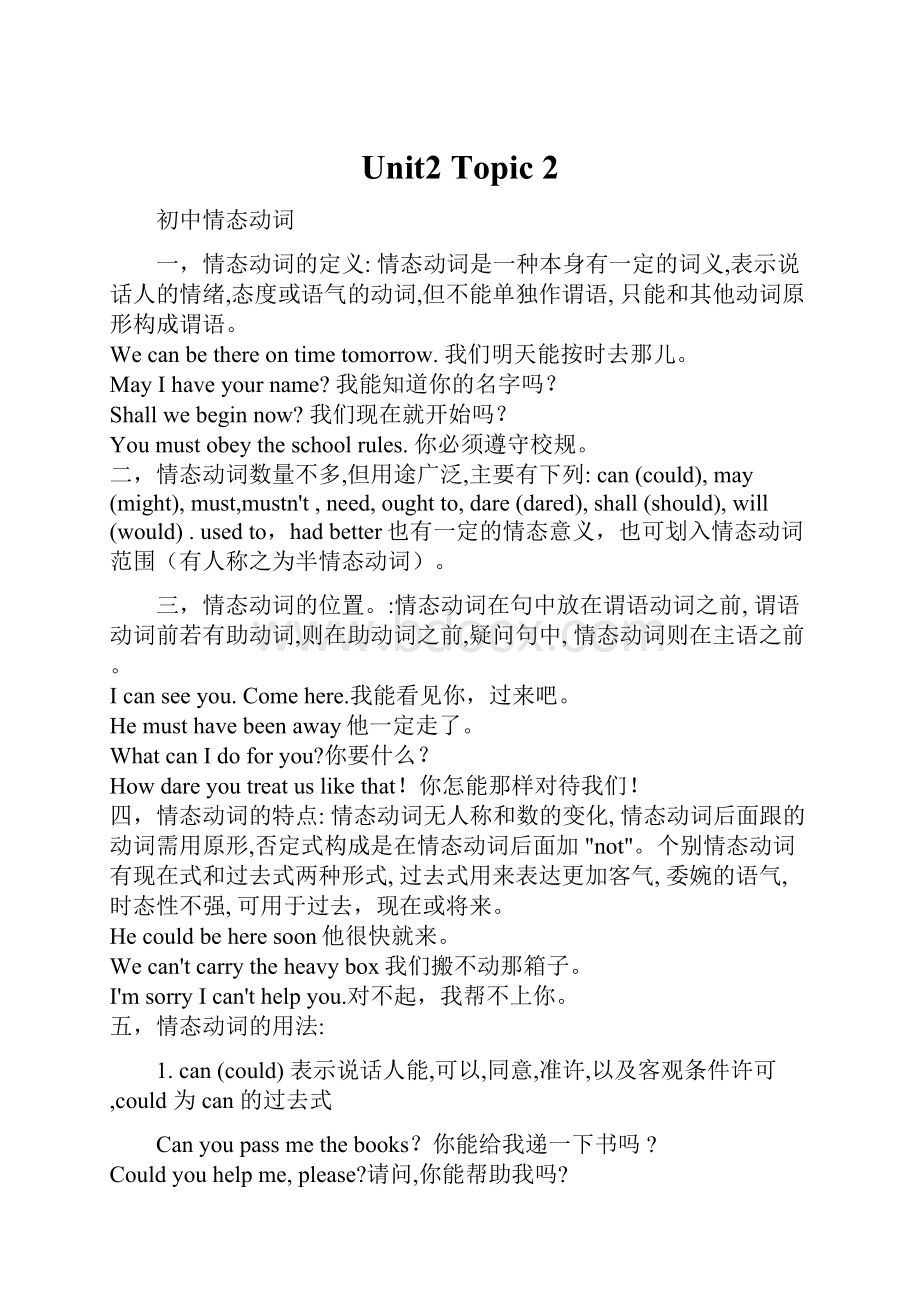Unit2 Topic 2.docx
《Unit2 Topic 2.docx》由会员分享,可在线阅读,更多相关《Unit2 Topic 2.docx(18页珍藏版)》请在冰豆网上搜索。

Unit2Topic2
初中情态动词
一,情态动词的定义:
情态动词是一种本身有一定的词义,表示说话人的情绪,态度或语气的动词,但不能单独作谓语,只能和其他动词原形构成谓语。
Wecanbethereontimetomorrow.我们明天能按时去那儿。
MayIhaveyourname?
我能知道你的名字吗?
Shallwebeginnow?
我们现在就开始吗?
Youmustobeytheschoolrules.你必须遵守校规。
二,情态动词数量不多,但用途广泛,主要有下列:
can(could),may(might),must,mustn't,need,oughtto,dare(dared),shall(should),will(would).usedto,hadbetter也有一定的情态意义,也可划入情态动词范围(有人称之为半情态动词)。
三,情态动词的位置。
:
情态动词在句中放在谓语动词之前,谓语动词前若有助动词,则在助动词之前,疑问句中,情态动词则在主语之前。
Icanseeyou.Comehere.我能看见你,过来吧。
Hemusthavebeenaway他一定走了。
WhatcanIdoforyou?
你要什么?
Howdareyoutreatuslikethat!
你怎能那样对待我们!
四,情态动词的特点:
情态动词无人称和数的变化,情态动词后面跟的动词需用原形,否定式构成是在情态动词后面加"not"。
个别情态动词有现在式和过去式两种形式,过去式用来表达更加客气,委婉的语气,时态性不强,可用于过去,现在或将来。
Hecouldbeheresoon他很快就来。
Wecan'tcarrytheheavybox我们搬不动那箱子。
I'msorryIcan'thelpyou.对不起,我帮不上你。
五,情态动词的用法:
1.can(could)表示说话人能,可以,同意,准许,以及客观条件许可,could为can的过去式
Canyoupassmethebooks?
你能给我递一下书吗?
Couldyouhelpme,please?
请问,你能帮助我吗?
Whatcanyoudo?
你能干点什么呢?
Canyoubesure?
你有把握吗?
can和could只能用于现在式和过去式两种时态,将来时态用beableto来表示。
Hecouldhelpusatall。
他完全可以帮助我们。
Withtheteacher'shelp,IshallbeabletospeakEnglishcorrectly.
由于老师的帮助,我将能准确地讲英语。
注意:
Can[Could]Icomein?
我可以进来吗?
"Could[Can]Iuseyourpen?
""Yes,ofcourseyoucan."“我可以用你的钢笔吗?
”“是的,当然可以。
”(不能说Yes,youcould.)注:
could表示过去的能力,通常只用于表示过去的一般性能力,而不表示过去具体某次特定情形下能够做某事的能力。
如:
他学习很努力,所以考试能及格。
误:
Hestudiedhardandcouldpasstheexam.
正:
Hestudiedhardandwasabletopasstheexam.
2.may(might)可以,表示说话人同意,许可或请求对方许可。
Youmaytakethebookhome.你可以把书带回家去.
MayIcomein?
我可以进来吗?
MayIuseyourdictionary?
我可以用你的词典吗?
Youmayputonmoreclothes.你可以多穿点衣服
Hesaidhemightlendussomemoney.他说他可以借给我们一些钱。
may否定式为maynot,缩写形式是mayn't.
might是may的过去式,有两种用法,一种表示过去式,一种表示虚拟语气,使语气更加委婉,客气或对可能性的怀疑。
Hetoldmehemightbehereontime他说他能按时间来。
MightIborrowsomemoneynow我可以借点钱吗?
Hemightbealive.他可能还活着。
3.Must必须,应该,一定,准是,表示说话人认为有必要做某事,命令,要求别人做某事以对事物的推测.must用来指一般现在时和一般将来时,过去式可用haveto的过去式代替。
Imustfinishmyworktoday.我今天必须完成我的工作。
Youmustn'tworkallthetime.你不能老是工作。
MustIreturnthebooktomorrow?
我必须明天还书吗?
Aftersuchalongwalk,youmustbetired.走了这么长的路,你一定困了。
HemustbethemanIamlookingfor.他一定是我要找的人。
Hehadtogobecauseofsomebody'scallinghimthatday.那天他要走是因为有人叫他。
must+have+过去分词,表示现在对过去事物的推测。
Hemusthavetoldmyparentsaboutit.他一定把这件事情告诉我父母亲了。
Hemusthavereceivedmyletternow.他现在一定收到我的信了。
It'ssixo'clockalready,wemusthavebeenlateagain.已经六点钟了,我们一定又迟到了。
must和haveto的区别:
must表示说话人的主观思想,haveto表示客观需要。
Youmustdoitnow.你必需现在就干。
(说话人认为必须现在干)
Ihavetogonow. 我得走了。
(客观条件必须现在走)
回答must提问:
(1)肯定回答:
Yes,----must.
(2)否定回答:
No,--needn't./No,---don't/doesn'thaveto.
4.need需要多用在否定式或疑问句.
NeedIattendthemeetingtomorrow?
我需要明天参加会议吗?
Youneednothandinthepaperthisweek.这一周你不必交论文。
need是一个情态动词,他的用法完全和其他情态动词一样,但need还可当作实义动词使用,这时need就象其他动词一样,有第三人称,单复数,后面加带to的动词等特性。
Ineedabiketogotoschool.我上学需要一辆自行车。
Doyouneedadictionary?
你需要词典吗?
Sheneedsanecklace.她需要一条项链。
needn't+have+过去分词表示过去做了没必要做的事情。
Youneedn'thavetakenitseriously.这件事情你不必太认真。
5.dare敢多用在否定或疑问句中
Thelittlegirldarenotspeakinpublic.小女孩不敢在公众面前说话。
Dareyoucatchthelittlecat?
你敢抓小猫吗?
dare除用作情态动词外,更多的是当实义动词使用,用法同实义动词一样,要考虑人称,单复数,时态等。
Doyoudaretowalkinthedark?
你敢黑夜走路吗?
Hedoesn'tdaretotelltheteacherwhathappenedthatday.他不敢告诉老师那天发生的事。
6.ought应当,应该后面跟带有to的动词不定式。
Yououghttoreadthesebooksifyouwanttoknowhowtorepairthemotorcar.
如果你想知道如何修理汽车,你应该读这些书。
Yououghttobringthechildhere.你应该把孩子带来。
ought+tohavedone句型。
指过去动作,表示一件事情该做而未做。
Yououghttohavebeenhereyesterday.你昨天就应该来。
oughtnottohavedone句型。
表示一件不该做的事情却做了。
Yououghtnottohavetakenthebookoutofthereading-room.你不应该把书带出阅览室。
7.will(would)决心,愿望。
would为will的过去式,可用于各人称。
I'lldomybesttocatchupwiththem我要尽全力赶上他们。
I'llneverdoitagain,that'sthelasttime.我再不会做那件事情了,这是最后一次。
Hesaidhewouldhelpme.他说他会帮助我。
will,would用于疑问句表示说话人向对方提出请求或询问,用would比will更婉转
It'shot.Willyouopenthewindows?
天气太热了,你能打开窗户吗?
Willyouhelpmetoworkitout?
你能帮我解这道题吗?
Wouldyoulikesomecoffee?
给你来点咖啡怎样?
8.Shall,should表示命令,警告,允诺,征求,劝告,建议惊奇。
在疑问句中用于征求对方意见,主要用于第一人称(在英国英语中,也用于第三人称),其意为“要不要”、“……好吗”。
如:
Shallwemeetagaintonight?
咱们今晚要不要再碰头?
Shalltheywaitforyou?
要不要他们等你?
在陈述句中表示说话者的允诺、告诚、威胁、命令、规定、必然性等,主要用于第二、三人称。
如:
Youshallsufferforthis.你会为此吃苦头的。
(表告诫)
Thatdayshallcome.那一天一定会来。
(表必然性)
Youshallheareverythingdirectlyyoucome.你一来就可听到所有情况了。
(表允诺)
注:
用于第一人称,则表示决心。
如:
Ishallreturn.我一定回来。
(表示决心)
9.usedto与would的用法
两者均可表示过去的习惯,有时可互换。
如:
Iusedto[would]gothereeveryyear.我每年都去那儿。
但强调与现在对比或者与状态动词连用时,通常要用usedto,若与时间段或含“有时”意义的词连用,要用would。
如:
Heusedtolikeyou.他从前是喜欢你的。
Heisnotwhatheusedtobe.他已不是从前的他了。
Hedoesn'tworkherenow,butheusedto.他现在不在这儿工作了,但他曾经在这工作过。
10.hadbetter和wouldrather的用法
hadbetter意为“最好”,wouldrather意为“宁愿”,两者均后接动词原形,否定式均在动词原形前加not;在否定疑问句和反意疑问句中可分别用hadn't和wouldn't。
如:
You'dbetternotdisturbhim.你最好别去打扰他。
He'drather(not)gobycar.他宁愿(不)坐汽车去。
注:
wouldrather后接宾语从句时,从句谓语要用虚拟语气,即用一般过去时表示现在或将来,用过去完成时表示过去。
如:
I'dratheryouwenttomorrow.我宁愿。
你明天去。
I'dratherhehadn'ttoldmeaboutit.我宁愿他没告诉我这事。
一.用情态动词填空。
1.You’vebeenworkingallday.You_____beverytired.
2.Iwonderwhothatis.It____beLisa.Shestillinthelibrary.
3.It’salongtimesincewemeetlasttime.You____comeandseeusmoreoften.
4.Ihaven’tdecidedwhereI’mgoingformyholidays.I_____gotoAustralia.
5.Myfather’sbirthdayiscoming.What____Igethim?
6.Whydon’tyoutryonthisdress?
It___lookniceonyou?
7.Idon’tknowwhentheguests____behere.They_____arriveatanytime.
8.Wehavegotlittletime.We_____hurry.
9.wehavegotplentoftime.We_____hurry.
10.Wehaveengoughfoodathome,sowe____goshoppingtoday.
11.Thereislotsoftimeforyoutomakeupyourmind.You____decidenow.
12.Itisavaluebledictionary.You___lookafteritcarefullyandyou____loseit.
二.选择填空。
1. I __________ you, because I thought I must be wrong.
A. dare not ask B. dare not to ask C. dare not asking D. dare to not ask
2. There __________ some flowers in the garden.
A. were used to be B. used to be C. uses to be D. used to be having
3. "__________ I take it out?
" "I'm sorry, you __________."
A. Could ...couldn't B. Might...might not C. Could...can D. May...can't
4. You were stupid to climb the tree. You __________ hurt yourself.
A. may B. might C. will D. might have
5. You __________ those letters. Why didn't you ?
A. should post B. should have posted C. must have posted D. ought to post.
6. All the lights are on, the Smiths __________ up.
A. must get B. is getting C. must be getting D. would get
7. He __________ lead a horse to the water but he __________ not make it drink.
A. will...can B. may...can C. may...dares D. dare...can
8. "Need we do this job now?
" "Yes, __________."
A. you need B. you should C. you must D. you can
9. __________ to have lunch with us today?
A. Do you likes B. Would you like C. Will you liked D. Have you liked
10. He said that you __________ watch TV all the evening if you wished.
A. may B. must C. can D. might
11. -Is John coming by train?
--He should, but he __________ not. He likes driving his car.
A. must B. can C. need D. may
12. Peter __________ come with us tonight, but he isn't very sure yet.
A. must B. can C. may D. will
13. Michael __________ be a policeman, for he's much too short.
A. needn't B. can't C. shouldn't D. won't
14. I thought you __________ be hungry, so I have brought you some cakes.
A. may B. might C. can D. could
15. I wonder how he __________ that to the teacher.
A. dare to say B. dare saying C. not dare say D. dared say
16. Come on!
We __________ hurry because there isn't much time left.
A. may B. must C. can D. need
17. Amy did best in the English test. She __________ hard last week.
A. must have working B. should have worked C. should work D. must work
18. The fire spread through the hotel very quickly but everyone __________ get out.
A. had to B. would C. could D. was able to
19. ---I stayed at a hotel while in New York. ---Oh, did you?
You __________ with Barbara.
A. could have stayed B. could stay C. would stay D. must have stayed
20. It's nearly seven o'clock. Jack __________ be here at any moment.
A. must B. need C. should D. can
Topic2,专项练习
一、复习目标
【重点短语】
1.Whatcausedit?
=What’shappening?
怎么了?
2.watch…onTV在电视上看…
3.stayuplate=situplate熬夜
4.feelsleepy感到困倦fallasleep入睡
5.bebadfor对------有害begoodfor对------有益
6.toolittle/much太少/多
7.haveabigbreakfast吃一顿丰盛的早餐
8.domorning/eyeexercises做早操/眼保健操
9.keepfingernailslong长长指甲
10.playsportsright进行适当的体育锻炼
11.gotoschoolwithoutbreakfast不吃早餐上学
12.have/takeabath洗澡
13.takeafreshbreath呼吸新鲜空气
14.read----about---读关于-------
15.asksb(not)todo叫某人(别)做某事
16.giveupsth\doingsth=stopdoingsth放弃某事/做某事
17.readinthesun在太阳底下看书
18.inthenewspaper在报纸上
19.throwlitterabout/around乱扔垃圾
20.Don’twalkonthelawn禁止践踏草地
21.duringtheday=inthedaytime在白天atnight在夜晚
22.onanemptystomach空腹
23.put------into------把-------放进-----
24.getinto…through通过…进入
25.spitinpublic在公共场所吐痰
26.keeptheaircleanandfresh保持空气清新
27.asweknow正如我们所知道的那样/众所周知
28.indifferentways在不同的方面(以不同的方式)
29.lessthan少于/不到morethan=over多于/超过
30.somethingiswrongwith……出毛病了
31.washhandsbeforemeals饭前洗手
32.It’snecessaryfor…对…是必要的
It’snecessary(forsb)todosth.对某人而言做某事是必要的。